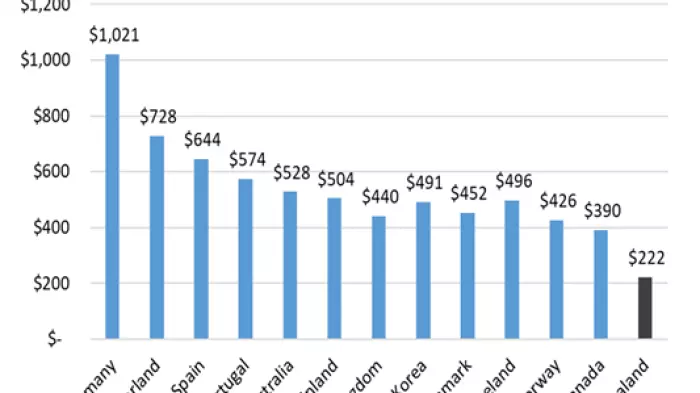BusinessDesk's investment editor, Frances Cook, responds to readers' emails on a weekly basis to answer various questions about money. Below you'll find her expert advice on a subject she's extremely passionate about.
Hi Frances,
When buying a house, how should a family decide what they can afford? If you have two working adults, should you base your decision on the current earning capabilities of both partners or should you buy something cheaper so the mortgage can be serviced on one income if the worst should happen, like layoffs or illness or pregnancy-related leave? In other words, just because you can, should you?
This question is in the context of what the bank is willing to lend to you and how you decide what you're comfortable borrowing, because it seems like banks are OK with a household paying more than 50% of their take-home pay on the mortgage but that might be a bad financial decision.
Even at 30% on two incomes, would the situation change dramatically if those two incomes become one?
I think any millennial hitting their 40s that went through the job market during the global financial crisis [GFC] would maybe relate to the anxiety around job security and the recession whispers that are making the rounds.
Thanks,
L
Hi L,
This is a great question that really hits the heart of why so many money questions are difficult. There’s what you can do, and then there’s what you’re comfortable doing.
I’m a firm believer that no amount of money is worth losing sleep over. With a recession, or at least rough economic times looming ahead of us, it’s smart to be cautious.
Then again, there’s the reality that houses are expensive, and for some people to be able to buy their first home, it might mean taking a tight budget to its limit. Is it worth it?
Let’s start with the ideal world.
The 50-30-20 rule is a budget rule that at least gives us a place to start.
It says you should spend 50% of your after-tax income on needs (housing, food, transport, utility bills), 30% on wants (entertainment, new clothes), and 20% on savings, debt repayment, and investing.
You might notice an immediate problem with this rule. In New Zealand, housing has become so expensive that plenty of us will be spending 50% or more of our income on housing alone.
I still think it’s useful to look at this rule as an ideal scenario. Then let's work backwards to what’s actually possible for your household.
How much income you need
If you'd be able to buy a house on two incomes and fit this rule, then you’ve probably set yourself up well. You have room to cut back on your spending if you need to, say if one of you loses your job.
Until something like that happens, you have a good house (hopefully), and a budget that lets you enjoy life, while also planning for the future.
If you can’t buy a house while fitting this type of budget, then you need to think about what you’re comfortable with in various scenarios where things might go wrong.
I’m not part of the ‘buy a house at any cost’ brigade. However, it's also a reality that owning your own home in NZ makes life more comfortable, both in terms of your finances and in terms of lifestyle.
Renters are likely to live in a less stable situation, to move more often, and can face rent hikes they weren’t expecting. Meanwhile, homeowners can gradually pay their home off, and hopefully eventually hit retirement with a home where they only need to pay for rates and insurance. That’s a huge cost gone, which makes retirement much easier.
Nobody truly knows the future, but the best predictions are that we’ll see house prices fall anywhere from 10-18% in the next 12 months.
Investor chat groups are already awash with grumbles about how long it’s taking to sell houses, and about nobody turning up to open homes.
It’s worrying for those who own a home, but for those looking to buy, it’s a unique opportunity. Now can be a good time to hunt for bargains, as long as you’re careful and don’t overstretch yourself.
If we look at a worst-case scenario, is it truly the case that if one of you lost your job, you'd be down to one income? Or would you be down to one income, and one much-reduced income?
Would the person who lost their job be willing to do whatever job they could find in order to chip in with the bills until they found their next career move that hopefully would pay better?
Perhaps you'd feel comfortable putting together a budget based on one current income, and one something-went-wrong lower income? That could be a way to bridge the gap, without limiting yourself unnecessarily.
Stress testing
Interestingly, you’re basically doing a different version of the existing bank stress test.
When banks decide whether or not to approve you for a mortgage, they don’t test whether you can afford it based on the advertised interest rate of, currently, around 5 to 5.5%. They run the numbers based on a higher interest rate, because they’re looking at you as a 30-year investment, and they want to be sure you can afford your mortgage through that entire time if interest rates go up.
It changes from bank to bank, but the big ones are currently stress-testing you at between 7 and 7.5% interest. So, if you’re interested to see what they see there, you can always look up an online mortgage calculator and change the interest rate to 7.5%, to see how that would change your budget.
Recession impacts
On a final note, I sympathise with anyone feeling anxious now that whispers of recession are becoming louder and louder. The one in 2008 was nasty, and since then we’ve had such a long period of boom times that it’s not fun to think about going backwards.
So, if it helps to keep things in context, the average recession lasts about 18 months. It's not pleasant, and I’m certainly not dismissing fears of losing jobs or facing financial instability. But we've been there before, and it’s not forever.
We may not want to do them, but there are often things we can do to get through and keep paying the mortgage if we get pinched through that time. Bring in a flatmate. Switch to cheaper food, like soups. If you're in a real bind, talk to the bank about paying interest-only for a time (although this really is for last resort moments).
If you have high cash savings, that’s another safety net you should factor in.
I don’t mean to make it sound grim, but I wanted to point out that there are options, even if things do get grim. I personally find it comforting to face the worst-case scenarios head-on, because while it’s often not nice to think about, it does make me realise I have more options than I thought.
They're options I don’t love, but options, nonetheless.
Final points
So, to sum up: if your potential mortgage would be under 50% of after-tax income for the two of you, you’re probably in a good position to base it on two incomes.
If it would be over that, have a look at what would happen if one income was to go down, and how much you could afford in that situation. Consider what you'd be willing to change, and how much you’re able to change if you bought a house and then faced a cut in income.
Which one should you do?
I can’t really tell you, because so much of this is based on how much risk would stress you out as an individual. But I want you to think about which version of this would have you losing sleep at night.
If you’re planning life changes that could have an impact on your income, or you feel that your job is possibly not recession-proof, then it doesn’t need to actually happen for it to stress you out.
Only you can weigh up those things, but please know that you’re not silly for wanting to factor them into your decisions.
Just try to ensure you’re being as emotionless as possible while you weigh up how real these factors are.
Send questions to [email protected] if you want to be featured in the column. Emails should be about 200 words, and we won't publish your name. Unfortunately, Frances is not able to respond to every email received, or offer individual financial advice.
Information in this column is general in nature, and should not be taken as individual financial advice. Frances Cook and BusinessDesk are not responsible for any loss a reader may suffer.














